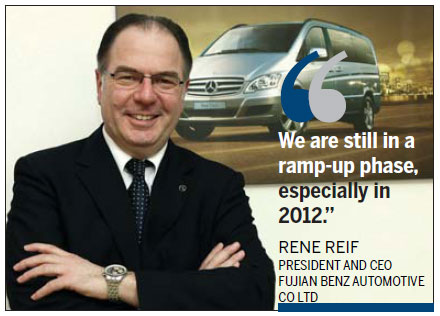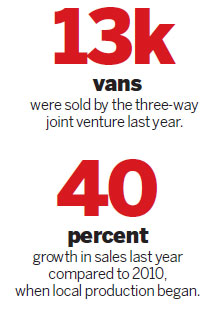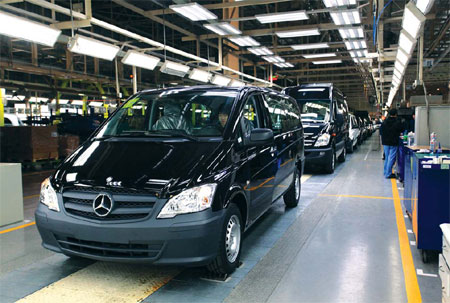New name for Benz van venture
Updated: 2012-03-05 11:24
By Han Tianyang (China Daily)
|
|||||||||||
|
Vans roll off the production line at Fujian Benz Automotive Co Ltd. [Photo/Provided to China Daily] |


'Benchi' badge has better recognition than Daimler
FUZHOU - Daimler AG's joint venture making Mercedes-Benz vans changed its name last week to Fujian Benz Automotive Co Ltd to improve brand recognition among Chinese consumers.
"What we found in China is that the name Daimler is not as well known as Benz," said Rene Reif, president and CEO of the company formerly called Fujian Daimler Automotive Co Ltd.
"Benchi", the clever Chinese translation for Mercedes-Benz, uses a similar pronunciation to the original German name while underlining the meaning "to sprint". It is well known across the nation.
The joint venture's new name is expected to emphasize its strong connection to the three-pointed star.
Before the change, some Fujian Daimler dealers even resorted to putting a Mercedes-Benz sedan in front of their showrooms to attract customers.
"This makes it easier for the customer to understand that we are here as a Mercedes-Benz plant," Reif said.
Established in 2007, the three-way joint venture between Damiler AG, Fujian Motors Group and China Motors Corp from Taiwan began building the Mercedes-Benz Viano and Vito vans in China in 2010.
Production of a larger van, the Sprinter, began in late 2011. The plant has the capacity to make 40,000 vehicles annually in two working shifts.
"We are still in a ramp-up phase, especially in 2012," said Rene Reif, president and CEO of the joint venture, noting the company is young and at the beginning of its journey.
Cautiously declining to release any sales targets, Reif did show some confidence by saying that "we will see at the end of the year whether we will achieve the targets or overachieve them".
The company sold about 13,000 vans last year - including a handful of imported models - an increase of more than 40 percent over the sales of about 9,000 vehicles in 2010, the year it started local production.
In fact, the "young company" has already propelled China into the top five markets for Mercedes-Benz vans worldwide. The nation even surpassed Germany to be the No 1 single market for the Viano in 2010, though it fell to second place last year.
The Viano, a high-end MPV with six or seven seats, contributes about two-thirds of its China sales, with the remainder coming from the Vito, a more entry-level model.
Sales of its Sprinter have been modest because it was just launched in November.
Reif said the MPV segment in China grew by 12 percent in 2011 and will maintain double-digit growth this year.
He is confident about the growth potential in China based on the number of vehicles owned per 1,000 people, which is just 25 to 28, compared to 500 in Europe or the US.
The majority of Mercedes-Benz van buyers in China are government or business customers.
But Reif said feedback from dealers shows more private buyers are interested, especially in the Viano.
"It's starting quite a trend that private users are looking for this vehicle," he said.
This year, Fujian Benz will add 10 to 15 dealer outlets in China to an existing network of 54 dealerships, Reif said.
The company's sales and service network covers all major cities and is now moving into smaller inland cities, he said.
The joint venture currently has two R&D facilities under construction at a cost of 500 million yuan in the outskirts of Fuzhou that will be completed in the fall.
The R&D centers will help boost local content and ensure the company can respond quickly to local customer requirements, Reif said.
The company now offers many interior modifications to meet local preferences in color, seats and the infotainment system.
"I am very confident that we are well positioned," Reif said. "We are on the right track and have the right products."
He said an electric Vito now produced in small numbers in Germany for tests could be brought to China if the demand is there.
"But there is no concrete plan now," he said. "It depends on the market."
- China targets 14% of M2 growth
- China faces many difficulties, challenges
- China to continue property regulation
- The economic challenges facing emerging China
- China's housing loans risk controllable
- China vows to create 9m new jobs in '12
- Workforce limit may affect prices, wages
- Hu urges enhancement of social security









